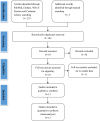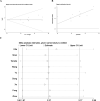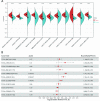Prognostic significance of cyclin-dependent kinase subunit 2 (CKS2) in malignant tumours: a meta-analysis and bioinformatic analysis
- PMID: 38296306
- PMCID: PMC10831450
- DOI: 10.1136/bmjopen-2023-073887
Prognostic significance of cyclin-dependent kinase subunit 2 (CKS2) in malignant tumours: a meta-analysis and bioinformatic analysis
Abstract
Objectives: This study aimed to systematically elucidate the prognostic significance of cyclin-dependent kinase subunit 2 (CKS2) expression in various cancers and its correlation with their clinicopathological characteristics.
Design: In this meta-analysis and bioinformatic analysis, articles were identified through searches of multiple databases and meta-analysed according to the Preferred Reporting Items for Systematic Review and Meta-analysis Protocols. Data from The Cancer Genome Atlas were examined using UCSC Xena tools to further confirm the prognostic effect of CKS2.
Data sources: The PubMed, Embase, Web of Science and Cochrane Library databases were searched for articles published from their inception to 1 January 2023, using a combination of subject terms and free words, including 'CKS2', 'cancer', 'tumor', 'neoplasm', 'carcinoma', 'malignancy' and 'prognosis'.
Eligibility criteria: The analysis included cohort or case-control studies, reported in English, with malignancy diagnoses confirmed by pathological methods, available HRs and 95% CIs for overall survival (OS) or extractable Kaplan-Meier curves, and a sample size of ≥20 patients. Reviews, commentaries, letters, conference reports, case reports, in vitro and animal studies, studies of CKS2 gene variants, studies with sample cases from public databases and studies with unavailable survival or duplicated data were excluded.
Data extraction and synthesis: Two researchers independently screened the articles, extracted the data and evaluated the quality of included studies using the Newcastle-Ottawa Scale. Meta-analysis and bioinformatic analyses were performed using the STATA and R software, respectively.
Results: The analysis included 13 retrospective studies encompassing 1348 cases across 10 cancer types. Nine studies involving 1124 patients examined the correlation between CKS2 expression levels and OS. A fixed-effects model analysis revealed a significant association between high CKS2 expression and reduced OS (HR=2.27, 95% CI=1.87 to 2.77, p<0.001). Furthermore, high CKS2 expression was significantly associated with advanced tumour stage (relative risk (RR) = 1.82, 95% CI=1.57 to 2.11, p<0.001), lymph node metastasis (RR=1.68, 95% CI=1.38 to 2.04, p<0.001), larger tumour size (RR=1.60, 95% CI=1.27 to 2.03, p<0.001) and lower differentiation grade (RR=1.57, 95% CI=1.29 to 1.90, p<0.001). CKS2 expression levels were not significantly correlated with patients' age (RR=1.11, 95% CI=0.99 to 1.26, p=0.071) or sex (RR=0.98, 95% CI=0.90 to 1.07, p=0.653). An assessment of the articles showed no significant publication bias, confirming the robustness of these findings. The bioinformatic analysis further confirmed CKS2 upregulation in the examined cancer types and its association with poor OS in glioma (HR=1.97, 95% CI=1.78 to 2.18, p=3.70×10-42), liver hepatocellular carcinoma (HR=1.56, 95% CI=1.31 to 1.86, p=3.50×10-7) and lung adenocarcinoma (HR=1.27, 95% CI=1.10 to 1.48, p=1.70×10-3).
Conclusions: Elevated CKS2 expression is associated with poor prognosis in a subset of malignant tumours, highlighting its potential as a prognostic marker.
Prospero registration number: CRD42023394038.
Keywords: gastrointestinal tumours; prognosis; systematic review.
© Author(s) (or their employer(s)) 2024. Re-use permitted under CC BY-NC. No commercial re-use. See rights and permissions. Published by BMJ.
Conflict of interest statement
Competing interests: None declared.
Figures




Similar articles
-
Cyclin-Dependent Kinase Regulatory Subunit 2 Indicated Poor Prognosis and Facilitated Aggressive Phenotype of Hepatocellular Carcinoma.Dis Markers. 2019 Oct 22;2019:8964015. doi: 10.1155/2019/8964015. eCollection 2019. Dis Markers. 2019. PMID: 31781310 Free PMC article.
-
CKS2 (CDC28 protein kinase regulatory subunit 2) is a prognostic biomarker in lower grade glioma: a study based on bioinformatic analysis and immunohistochemistry.Bioengineered. 2021 Dec;12(1):5996-6009. doi: 10.1080/21655979.2021.1972197. Bioengineered. 2021. PMID: 34494924 Free PMC article.
-
Clinicopathological value of the upregulation of cyclin-dependent kinases regulatory subunit 2 in osteosarcoma.BMC Med Genomics. 2022 Apr 11;15(1):81. doi: 10.1186/s12920-022-01234-8. BMC Med Genomics. 2022. PMID: 35410253 Free PMC article.
-
Association of Cyclin-Dependent Kinases 4 and 6 Inhibitors With Survival in Patients With Hormone Receptor-Positive Metastatic Breast Cancer: A Systematic Review and Meta-analysis.JAMA Netw Open. 2020 Oct 1;3(10):e2020312. doi: 10.1001/jamanetworkopen.2020.20312. JAMA Netw Open. 2020. PMID: 33048129 Free PMC article.
-
Association between LKB1 expression and prognosis of patients with solid tumours: an updated systematic review and meta-analysis.BMJ Open. 2019 Aug 5;9(8):e027185. doi: 10.1136/bmjopen-2018-027185. BMJ Open. 2019. PMID: 31383697 Free PMC article.
Cited by
-
Nuclear Transport Receptor Importin-β Inhibition Enhances Cell Cycle Arrest Induced by CKS2 Knockdown to Suppress Neuroblastoma Progression.Neurochem Res. 2025 Jul 22;50(4):245. doi: 10.1007/s11064-025-04488-7. Neurochem Res. 2025. PMID: 40696188
-
OTX2 expression contributes progression of gastric cancer in young adults.Sci Rep. 2025 May 9;15(1):16146. doi: 10.1038/s41598-025-99632-2. Sci Rep. 2025. PMID: 40341176 Free PMC article.
-
Biological functions and therapeutic potential of CKS2 in human cancer.Front Oncol. 2024 Aug 12;14:1424569. doi: 10.3389/fonc.2024.1424569. eCollection 2024. Front Oncol. 2024. PMID: 39188686 Free PMC article. Review.
References
Publication types
MeSH terms
Substances
LinkOut - more resources
Full Text Sources
Medical
Molecular Biology Databases
